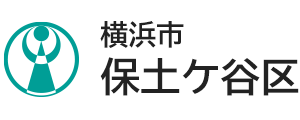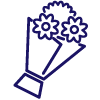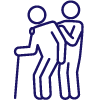- Yokohama-shi Top Page
- Hodogaya Ward Top Page
- Health, Medical Care and Welfare
- Health and Medical Care
- Health promotion
- Healthy trivia
- Healthy trivia "between eating"
Here's the text.
Healthy trivia "between eating"
This is a healthy trivia related to diet. "trivia" is "miscellaneous matters, knowledge, and trivia." The information provided here is supervised by Health and Welfare Center Hodogaya, referring to information from public institutions such as the Ministry of Health, Labour and Welfare.
Last Updated September 30, 2020
Click here for health trivia about diet.
1 High triglycerides are not only due to oil! ?
2 It is true that one cup of ramen has a salt content for one day! ?
3 Japanese people really lack 30% of dietary fiber! ?
4 It is true that hijiki does not contain much iron! ?
5 Children who are eating breakfast have better academic and physical strength! ?
6 About 80% of people in their 20s and 40s are really lacking vegetables! ?
7 The 500ml carbonated beverage really contains a lot of sugar! ?
8 It's true that "zero calorie" is not necessarily "0kcal"! ?
9 Biscuits really have twice as energy as buns! ?
1 High triglycerides are not only due to oil! ?
Painting of sweets
It's true.
Because the triglyceride numbers were high in physical checkup, many people may refrain from oily ones. However, in fact, the main causes of triglycerides are obesity and excessive intake of sugar such as sugar from sweets and drinks.
・Are you eating too much sweets and fruits late at night?
・Do you drink juice or coffee or tea containing sugar for hydration?
Let's review your daily diet.♪
2 It is true that one cup of ramen has a salt content for one day! ?
Ramen picture
It's true.
The target salt intake for Japanese people is less than 7.5g for men and less than 6.5g for women. (Dietary intake standard 2020 version) Drinking ramen to the soup contains about 7g of salt per cup, so it means that you have taken almost one day's salt content. Many people increase blood pressure by taking too much salt every day, so try to reduce salt on a daily basis. Even young people, if they consume too much salt, they will be at risk of higher blood pressure in the future, so be careful and learn a light lifestyle!
3 Japanese people really lack 30% of dietary fiber! ?
It's true.
The amount of dietary fiber required for Japanese people is 21g for men and 18g for women (dietary intake standard 2020 version), but the actual amount consumed is 14.4 g (results of the 2018 National Health and Nutrition Survey) ) And about 30% short!
Dietary fiber has many functions to prevent lifestyle-related diseases. Eat a lot of vegetables, mushrooms, and seaweeds that contain a lot of dietary fiber, and be conscious of building a healthy body!
4 It is true that hijiki does not contain much iron! ?
A picture of hijiki
It's true.
According to the food ingredient table, the amount of iron in hijiki (drying) is 58.2 mg per 100g. → This product has been reduced to 6.2 mg to 1/9. As a factor, iron kettle was used in the process of making hijiki in the past, but now it is a stainless steel kettle, so it has been analyzed that iron is decreasing. Iron intake for prevention of anemia, etc., should be taken from various ingredients such as soybean products, komatsuna, lean meat and liver.♪
5 Children who are eating breakfast have better academic and physical strength! ?
Pictures of children eating
It's true.
Several surveys show that children eating breakfast tend to have higher academic ability and physical strength. Eating breakfast makes it a habit of getting up early and getting up early, and there are many good things to do, such as getting your body clock. If you don't eat breakfast, you will run out of energy in the daytime, and you will be frustrated, unable to concentrate, or feel sick. If you are not eating breakfast, you can eat something a little, so if you are already eating breakfast, maintain it and think about better content!
Reference 1: Ministry of Education, Culture, Sports, Science and Technology (MEXT) FY2018 National Achievement and Learning Situation Survey Results Materials [National Version / Elementary School] 4 Results of questionnaire survey (3) Correlational coefficients, cross tabulation table (elementary school student questionnaire-subject) Question number 007 Do you eat breakfast every day (outside site)
Reference 2: Page 10 leaflet of the Ministry of Agriculture, Forestry and Fisheries' “Food Education Guide”
Eat breakfast and improve the efficiency of study and work (Document: Ministry of Education, Culture, Sports, Science and Technology “National Academic Achievement and Learning Status Survey” 2018 (outside site)
6 About 80% of people in their 20s and 40s are really lacking vegetables! ?
A woman with 350g of vegetables
It's true.
In order to satisfy the daily vitamins and dietary fiber, you need to consume 350g or more of vegetables. However, about 70% of Japanese people, especially about 80% in their 20s and 40s, do not reach 350g and are lacking in vegetables. Vegetables are an important source of vitamins and minerals, a nutrient necessary to make carbohydrates and proteins available to the body. Let's eat 3 meals and vegetable dishes a day, conscious of the daily target amount (350g).♪
Reference: Hodogaya Ward homepage Let's eat vegetables Let's prevent lifestyle-related diseases!
7 The 500ml carbonated beverage really contains a lot of sugar! ?
A picture of a juice
It's true.
Carbonated beverages are rich in sugar. What is the amount of it?…56g! This product contains 14 stick sugar of 4g of stick sugar. Be careful not to overtake too much sugar!
8 It's true that "zero calorie" is not necessarily "0kcal"! ?
A picture of a juice
It's true.
Not all "zero calorie" displayed on food does not mean "0kcal". Those that can be labeled "0kcal" are less than 5kcal per 100g of food (100ml of beverages). This means that beverages with 4kcal per 100 ml can be described as "zero calorie". If you take 500ml of this beverage, you have taken 20kcal. Be careful not to consume too much because it is labeled "zero calories"!
9 Biscuits really have twice as energy as buns! ?
A picture of a biscuit
It's true.
The main calorie sources of sweets are carbohydrates and lipids. The difference in calories is the amount of fat. The amount of fat in biscuit (soft) is about 69 times that of steamed bun (steamed). Two biscuits (50g) are about 260kcal (13.8g lipid, 31g carbohydrate 31g). One manju (50g) is about 130kcal (0.2g lipid, 30g carbohydrate 30g). Let's be careful about how much you eat!
Reference: 7 Revised Food Component Table
Please take a look at it.
For inquiries to this page
Hodogaya Ward Health and Welfare Division Health Promotion Section
Phone: 045‐334‐6344
Phone: 045‐334‐6344
Fax: 045‐333-6309
Email address: ho-kenkou@city.yokohama.jp
Page ID: 419-113-874













